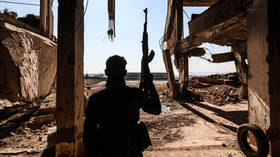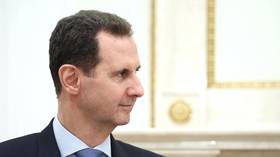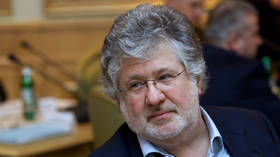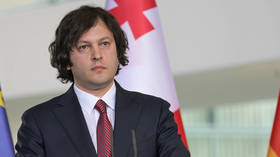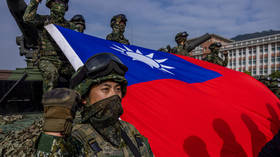What are terrorists in Syria trying to achieve?
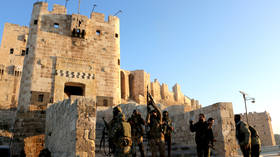
For the past few days, foreign-backed terrorists in Syria’s northwest have been attacking Syrian army positions in the Aleppo and Idlib countryside, and shelling civilian districts of Aleppo.
While regional media have been giving updates on these attacks and counterattacks by Syria and Russia, what is less clear is what is happening in Aleppo itself. Terrorist-aligned media claim Tahrir al-Sham (al-Qaeda re-branded) and allied terrorists have taken numerous western districts and even the city center.
But their proof – short videos showing terrorists in various areas they claim to control – was countered by videos of Syrians walking in key districts, saying things are calm. More on this later.
The following is what is known in summary about the attacks.
On Wednesday, November 27, Hayat Tahrir al-Sham and Turkish-backed National Army factions launched attacks in the Idlib and Aleppo countryside, in what they dubbed “Operation Deterrence of Aggression.”
According to Al-Mayadeen, as related by Syrian journalist Wassim Issa, convoys of militants, equipment and ammunition entered from the Bab al-Salam crossing with Türkiye and headed to the fighting fronts in the western Aleppo and southern Idlib countryside.
Al Mayadeen reported Tahrir al-Sham used new weapons and equipment, including Ukrainian drones, “reportedly acquired from Kiev’s intelligence services.”
Since Thursday evening, terrorists have been shelling Aleppo University dormitories, as well as districts of western Aleppo. On Friday, terrorist shelling killed four students and injured dozens.
By Friday, the Syrian Arab Army had re-taken many points breached by terrorists, Al Mayadeen reported, noting that intense fighting continues on two fronts in rural Aleppo, and that on the Idlib front, “armed groups are attempting to open a new axis after their failure to advance further toward the M5 international highway for all traffic from the south to Aleppo, through Hama and SE Idlib.”
The General Command of the Army and Armed Forces issued the following statement:
“Our armed forces were able to inflict heavy losses on the attacking organizations, inflicting hundreds of dead and wounded among their ranks, destroying dozens of vehicles and armored vehicles, and were able to shoot down and destroy seventeen drones.
...In a related context, terrorist organizations, through their platforms, publish misleading information, news and video clips aimed at terrorizing citizens. The General Command of the Army and Armed Forces warns our fellow citizens not to accept this news and misinformation, and to receive what is issued by the national media and its official platforms.”
As of late Friday, citing the Russian Coordination Center in Syria, Al Mayadeen reported that more than 600 terrorists had been killed. This update went on to detail Syrian and Russian airstrikes on terrorists in the northern Aleppo and Idlib countryside.
These attacks, apparently supported by Türkiye, the US, and Israel, mark the latest effort to destabilize Syria and weaken the ‘Axis of Resistance’ against Israel. It is of course notable that these attacks commenced just after the so-called ceasefire between the Lebanese Resistance, Hezbollah, and Israel (which began violating the ceasefire almost immediately, as Israel has done with virtually every ceasefire in the past).
One possible reason for Türkiye’s involvement could be to pressure Syrian President Bashar Assad into reconsidering his stance on normalization talks with Ankara. Assad previously rejected any such talks while Turkish forces remain in Syria, and according to some analysts. Turkish President Recep Tayyip Erdogan could have helped escalate military action to coerce Assad to change his mind.
Another motivation for the attack could be to cut Lebanese Hezbollah off from supply lines during the ceasefire with Israel. From Damascus, British journalist Vanessa Beeley wrote: “This attack has been spoken about and planned for since the beginning of the Israeli aggression against Lebanon... Now Syria will be the target to destroy weapons supply lines and manufacturing facilities that would rearm Hezbollah during the ceasefire. There will be attempts to destroy the land bridge infrastructure that brings materials from Iran, through Iraq and Syria to Lebanon. This includes essential humanitarian relief supply lines. Syria is the beating heart of the Resistance and must be protected at all costs.”
Attempts to resuscitate the Syrian ‘revolution’
Unsurprisingly, there are calls on social media for President Assad to be removed; the same calls heard during the Western-orchestrated media psyop which saw ignorant people around the world supporting a very bloody “revolution” in 2011.
It was never a revolution, and it was never (for Syrians) about Assad (who is overwhelmingly supported). What kind of revolution destroys its own culture, heritage and civilians, and partners with the US and Israel, among others?
On one of my four trips to Aleppo in 2016 alone, in November, before Aleppo was liberated from terrorist forces, the head of forensic medicine at a local hospital, Dr. Zaher Hajo, told me that since the occupation of Aleppo in 2012, 10,750 civilians had been killed by terrorists, 40% of whom were women and children.
On that same visit, I met three prominent Sunni leaders who, according to the priest who introduced us, were considered ‘infidels’ by al-Nusra and company because they didn’t follow their distorted terrorist ideology. One of them, Dr. Kukeh said: “Those who are killing the Sunnis are the same who claim that they are defending the Sunnis. The shells that hit us daily are sent by them.”
Dr. Kukeh, who said he named his oldest son after Hezbollah leader, Hassan Nasrallah, “because I love that man,” explained that in 2012 he was living in eastern Aleppo when terrorists began to occupy districts there. He was targeted for assassination because he did not agree with the terrorists’ ideology.
The Aleppo university dorms which were targeted recently were likewise routinely targeted in 2016. At the time, they had for four years been housing well over 10,000 internally displaced Syrians from areas of Aleppo and its countryside, including from areas occupied by the terrorists.
In subsequent visits in 2017 and years after, I saw the remnants of the terrorists’ occupation of eastern regions of Aleppo (underground prisons with solitary confinement cells), took testimonies of Syrian civilians on life under terrorist rule, and later, saw the city begin to rebuild and flourish, with businesses reopening, ancient markets being restored, life bustling around the famous citadel (during the reign of the terrorists, walking near it meant almost certainly being sniped dead) and atop the citadel.
The city that Western and Gulf corporate media claimed “fell” when it was liberated from al-Qaeda, ISIS and their co-terrorists came back to life under the rule of the Syrian government.
Current chaos: Aleppo occupied?
Throughout the fighting, there have been conflicting reports of terrorists taking parts of Aleppo. As I wrote at the beginning, photos and videos which appeared to show a terrorist presence in western Aleppo neighborhoods and even the city center aren’t proof of terrorists having taken districts.
It isn’t difficult for sleeper cell terrorists to pop up, take these photos and videos, and leave. Time will show which of their claims are true and which are part of psychological warfare to demoralize Syrians and turn them against their army and even against Russia.
Recall the General Command of the Army’s warning regarding misinformation. Making definitive declarations about the condition of Aleppo and surrounding region, without proof, is irresponsible and unhelpful. In a clickbait age where everyone wants to be the first to post “BREAKING” followed by some unverified soundbite, discerning the truth is complicated.
If the unthinkable happens and parts of Aleppo are re-occupied by terrorists no different from and even including ISIS, they will ultimately be defeated by Syria, Russia, and their allies, just as they were before.
The statements, views and opinions expressed in this column are solely those of the author and do not necessarily represent those of RT.

